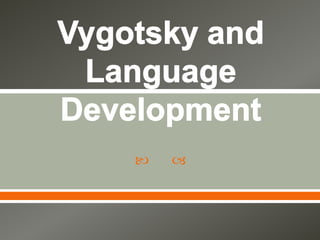Vygotsky and language development
•
87 recomendaciones•218,914 vistas
Denunciar
Compartir
Denunciar
Compartir

Recomendados
Recomendados
Más contenido relacionado
La actualidad más candente
La actualidad más candente (20)
Learning Process: Behaviorism, Cognitivism and Constructivism

Learning Process: Behaviorism, Cognitivism and Constructivism
Chomsky's theories of-language-acquisition1-1225480010904742-8

Chomsky's theories of-language-acquisition1-1225480010904742-8
Discontinuity Theory - Language Across the Curriculum

Discontinuity Theory - Language Across the Curriculum
Destacado
Destacado (11)
Similar a Vygotsky and language development
Work Education- Lev VygotskyPsychological Basis for Work in Education- Vygotsky.pptx

Psychological Basis for Work in Education- Vygotsky.pptxDr. Peeyush Kamal, Jamia Millia Islamia - Faculty of Education
Similar a Vygotsky and language development (20)
Vygotskys-Sociocultural-Theory-of-Cognitive-Development.pptx

Vygotskys-Sociocultural-Theory-of-Cognitive-Development.pptx
Psychological Basis for Work in Education- Vygotsky.pptx

Psychological Basis for Work in Education- Vygotsky.pptx
Lev vygotsky and his work on cognitive development

Lev vygotsky and his work on cognitive development
Más de Danilavsky Oropezovich Vaäzkz
Más de Danilavsky Oropezovich Vaäzkz (12)
Vygotsky and language development
- 1.
- 2. Language is a social concept that is developed through social interactions. According to Lev Vygotsky, a 20th-century Soviet psychologist, language acquisition involves not only a child's exposure to words but also an interdependent process of growth between thought and language. Vygotsky's influential theory of the "zone of proximal development" asserts that teachers should consider a child's prospective learning power before trying to expand the child's grasp of language.
- 3. Vygotsky's theory of language is based on constructivist learning theory, which contends that children acquire knowledge as a result of engaging in social experiences. "Through social and language interactions, older and more experienced members of a community teach younger and less experienced members the skills, values, and knowledge needed to be productive members of that community," says Harry Daniels, author of "An Introduction to Vygotsky."
- 4. According to Vygotsky, words are signals. Rather than engage children in a primary signal system, in which objects are referred to merely as themselves, adults engage children in a secondary signal system, in which words represent objects and ideas.
- 5. A child's intellectual development is crucial to his language development. By interacting with his environment, a child develops the ability to develop private, inner speech. "Inner speech is thinking in pure meanings; it is the link between the second signal system of the social world and the thought of the individual,"
- 6. Through the development of inner speech, children straddle the divide between thought and language, eventually being able to express their thoughts coherently to others.
- 7. The language learning process occurs as a result of give and take. Parents and teachers usher a child through a process of guided discovery, addressing her learning potential. Eventually, children internalize language skills. As young learners experience language development, they "can reflect better on their own thinking and behavior and reach greater levels of control and mastery over their own behavior," according to Adam Winsler, co- editor of "Private Speech, Executive Functioning, and the Development of Verbal Self- Regulation".
- 8. Vygotsky's constructivist language theory exists in opposition to Jean Piaget's theory of language acquisition. According to Piaget, children construct knowledge about language through a complex process of assimilation, stressing the inherent capability of a child's brain to adapt to stimulation. By contrast, Vygotsky stresses the social nature of language learning, emphasizing the environment within which a child is raised.
